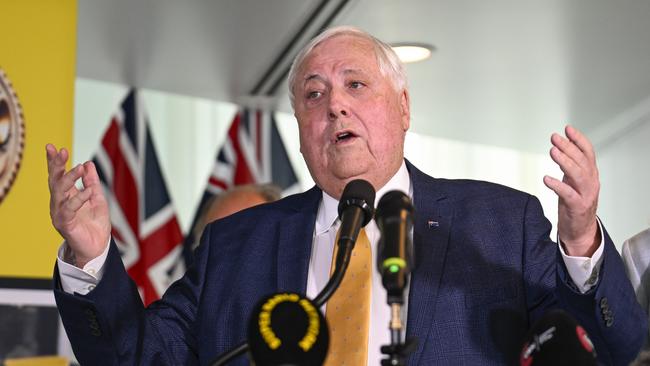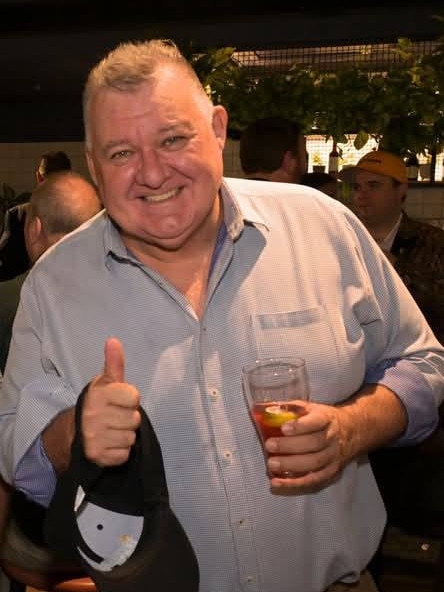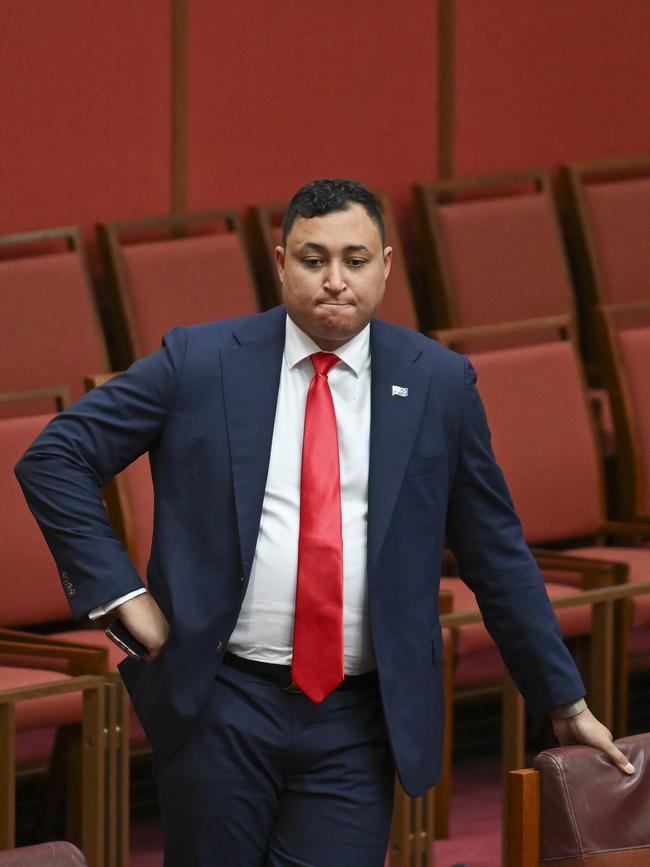
The Greens vote was down to a dismal 8 per cent while minor parties on the left such as the Legalise Cannabis Party received 5.5 per cent and the Victorian Socialists 7 per cent. If the same figure were represented in a Senate ballot we might well have a Victorian Socialist senator to add to the three-ring circus on the crossbenches. PT Barnum, eat your heart out.
The watershed for the major parties’ combined primary vote is 70 per cent. In Newspoll, Labor’s primary vote is in the low 30s, the Coalition sits at 38 per cent, the Greens are at 12 per cent, Pauline Hanson’s One Nation is at 7 per cent and other parties – left, right and independent – sit alongside the Greens at 12 per cent.
The latest entrant in the strictly for minors grouping is Clive Palmer’s Trumpet of Patriots, possibly abbreviated to TOP. The guff on the website cites the Trump administration’s war on government waste without actually mentioning the US President by name, but it is clear who the party is pitching at. Break out the fake tan for one lucky candidate.
The party’s logo is an aesthetic nightmare, featuring a lion with flowing mane blowing not a trumpet but what appears to be a vuvuzela. The party’s Latin motto is the incongruous Honor Omnia – Honour Everything. Bend a knee to feral cats, pond slime, the heartache of psoriasis, the Cahill Expressway in Sydney – you name it, it must be honoured.
Palmer lost his High Court bid to re-register the United Australia Party in time for the federal election, meaning any candidates cannot be identified with the UAP on ballot papers. A change is as good as a holiday so Palmer decided to piggyback on to a registered party, the Australian Federation Party, and rename it.
It’s all above board, but launching a new party comes with its own set of weighty tasks. Candidates are actively being sought to appear on the ballot, with the cut-off just nine days away.
Palmer had deregistered the UAP just months after the 2022 federal election but seemed not to have informed his one and only parliamentary representative, senator Ralph Babet.
This led to an entertaining exchange between a journalist and the senator of the dog ate my homework variety.
Babet originally denied the party had been deregistered but, when shown proof of it, he had an epiphany. He had been told of the deregistration but had forgotten about it and assured journalists the UAP was forever.

“Of course, myself being a parliamentary leader of (the) United Australia Party, we own the trademark, we will be immediately re-registered next time.”
The High Court says no. Get that senator a vuvuzela.
The provisions of the election reform bill, much loathed by the minor parties, do not kick in until 2028 so this is possibly Palmer’s last hurrah in terms of expensive political advertising, estimated at $100m alone in 2022 with a net return of just Babet.
One of the better organised parties on the right, the Libertarian Party (formerly the Liberal Democrats), is seeking to run candidates across the land. They have had significant growth in the number of financial members and elected John Ruddick to the upper house in the NSW parliament.
The aim of the NSW branch is to have Craig Kelly elected to the Senate, which would probably mean the loss of a Liberal senator from NSW. Kelly, who has been in more parties than Paris Hilton, would be an outside chance but 7 per cent of the Senate vote in NSW is easier said than done.
The Libertarians’ major enemy on the left is not Labor or the Greens, which admittedly they despise, but the Legalise Cannabis Party.
Both espouse basic libertarian values, although the Legalise Cannabis Party restricts its calls for freedom to smoking weed. The skull bong set can be a powerful if niche voting bloc in the general electorate, although one can only imagine the rupture in the space-time continuum when Legalise Cannabis Party voters stumble into a polling booth and are asked, “Have you voted before in this election?”

There are a raft of eponymous parties, led by Pauline Hanson’s One Nation. There’s Katter’s Australia Party. There is also Gerard Rennick People First, the party named after the former Queensland Liberal National Party senator. And who could forget the Jacqui Lambie Network? Alas, we try, but she just keeps talking.
The trouble with attaching a leader’s name to a minor political party is that when the leader decides to stroll off into the sunset or, god forbid, gets hit by the No.24 bus, the party really has nowhere to hang its hat.
There are several independents who stand better than even money chances of sitting in the new parliament.
Russell Broadbent lost Liberal preselection for the seat of Monash in 2023 and is running as an independent. I’d be more than a little surprised if he doesn’t win and take up a place on the crossbench. In the event of a hung parliament, it would be amusing to see Liberal Party bigwigs knocking on his door, cap in hand.
The battle is not so much about getting their candidates elected in the Senate or even the House of Representatives but how their preferences will flow. The major problem for the Coalition is that when it loses primary votes to, let’s say, the Libertarian Party or PHON, the preferences don’t come back, at least not with the force one would expect.
Greens preferences flow to Labor at a rate of 80 per cent but PHON preferences the Coalition at around 65. Ultimately, in a close contest, preference flows will determine who wins the next election and who loses it and maybe, just maybe, who will hold the balance of power.





There is no denying the major parties are on the nose. Gone are the good old days when the majors scooped up nine out of 10 voters. In the Victorian state by-election in Werribee a fortnight ago, the two major parties combined could not reach 60 per cent of the primary vote.